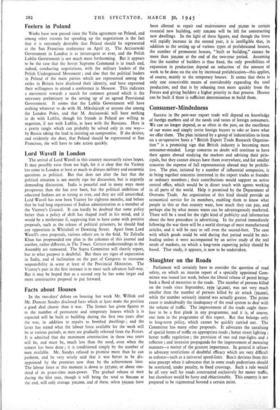Slaughter on the Roads
Parliament will certainly have to consider the question of road safety, on which an interim report of a specially appointed Com- mittee was issued last week, before the liberal release of petrol brings back a flood of motorists to the roads. The number of persons killed On the roads since September, 1939 (41,00o), was not very much smaller than the number of persons killed by air attack (59,000), while the number seriously injured was actually greater. The prime" cause is undoubtedly the inadequacy of the road system to deal with the volume of traffic. The improvement of the roads ought there- fore to be a first plank in any programme, and it is, of course, one item in the programme of this report. But that belongs only to long-term Policy, which cannot be quickly carried out. The Committee has many other proposals. It advocates the canalising of special forms of traffic on appropriate roads ; better street lighting ; better traffic regulation ; the provision of two red rear-lights and a reflector ; and intensive propaganda for the improvement of motoring manners—a matter of the greatest importance. In general it refuses to advocate restrictions of doubtful efficacy which are very difficult to enforce—such as a universal speed-limit. But•it deviates from this wise precept when it advocates that in some roads pedestrians should be restricted, under penalty, to fixed crossings. Such a rule would be all very well for roads constructed exclusively for motor traffic, but elsewhere would be fussy and objectionable. This country is not prepared to be regimented beyond a certain point.






















 Previous page
Previous page